The combination of the demise of Obamacare and the forthcoming presidential election puts the issue of health care reform in the spotlight – again. Democrat presidential candidates and their colleagues have made the financially unsustainable and unrealistic “Medicare for All” the hallmark of their reform plan. President Trump has taken steps to strengthen Medicare and increase transparency in health care and promises more reforms to come.
Reforming health care is a complex, daunting undertaking that can intimidate those with a weak disposition. It’s difficult for politicians to agree on where to begin the discussion for the reform that must take place.
AMAC – the Association of Mature American Citizens recommends Congress start the reform journey by passing H.R. 856, the Physician Pro Bono Care Act. This bipartisan bill, introduced by Daniel Webster (R FL-11) and 24 cosponsors, is designed to increase access to quality care for poor individuals and families while saving the Medicaid and CHIP programs billions of dollars at the same time – far exceeding the cost of the deduction to tax revenues.
Physicians are not strangers to charity care. They experience caring for the less fortunate throughout their training and this treatment carries over to their practices when their instruction is completed. H.R. 856 gives physicians the opportunity to practice charity care in their own offices. It simply allows a physician to choose to forego, on a patient-by-patient basis, the cumbersome and time-consuming Medicaid reimbursement process and voluntarily take a small tax deduction for their professional services in exchange for treating a Medicaid or CHIP eligible patient at no charge. H.R. 856 will not interfere with any benefit that these programs offer beneficiaries.
Recommended
Let’s look at some numbers. Any emergency department physician will tell you that many Medicaid patients seek their services for non-emergency, chronic care. They’ll also tell you that the emergency department is one of the most expensive places to be treated for non-acute care. According to data from late 2016, over 20 million Medicaid patients visited an emergency department for care. The fee for each of these visits was approximately $1016 and cost the Medicaid program over $20 billion.
If only 7 million of these 20 million Medicaid patients instead went to a primary care physician for their non-emergency treatment, and the doctor was able to take a 32 percent deduction (an estimate based on the tax cut bill passed in 2017) on their professional services (the average primary care office visit is $160), the cost to the Medicaid program per visit is reduced from $1016 to approximately $50!
As mentioned earlier, participation in the tax deduction is voluntary and a physician would have the option to treat Medicaid and CHIP-eligible patients pro-bono or accept these programs’ reimbursement. H.R. 856 may be expanded beyond primary care doctors to include emergency room physicians, clinic physicians, dentists, chiropractors, and other health care practitioners.
As more doctors adopt the precepts of H.R. 856, the access to quality care increases and long-term physician-patient relationships are formed leading to better health outcomes for an at-risk demographic. Note that there are no pre-existing conditions to consider with the Medicaid and CHIP-eligible population, all who seek care will be treated.
So, why not start the imminent health care reform discussion with breaking the cycle of expensive care for Medicaid and CHIP-eligible patients, giving them the opportunity for better health outcomes for themselves and their families and significantly reducing state and federal Medicaid expenditures?

























Join the conversation as a VIP Member